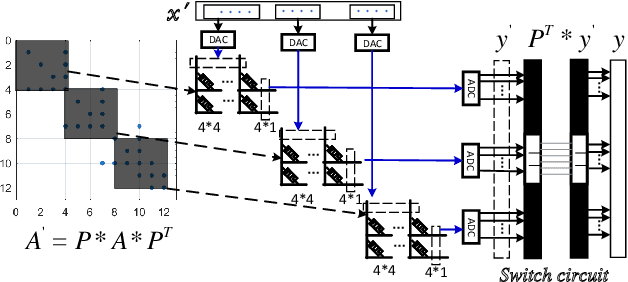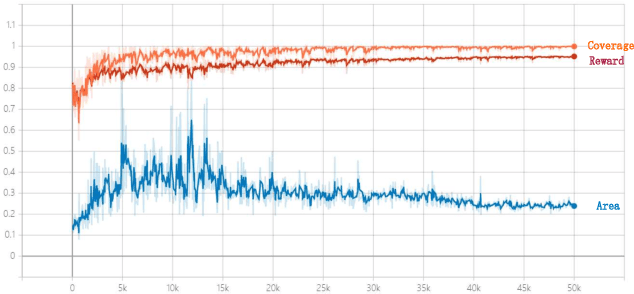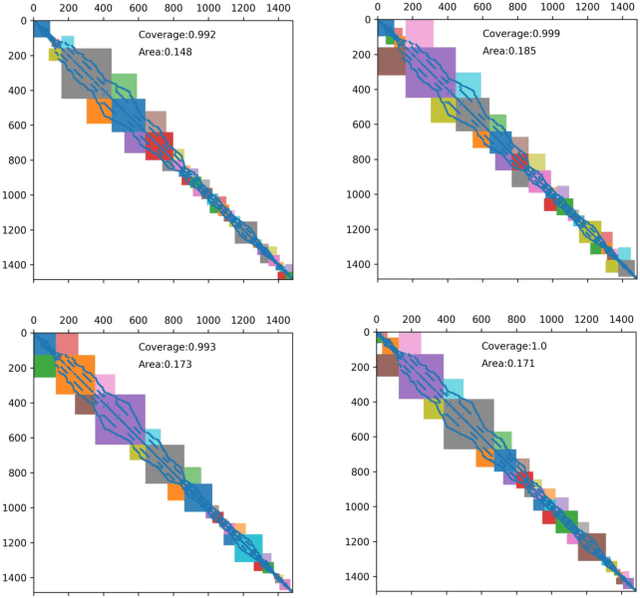Bo Lyu
AutoGMap: Learning to Map Large-scale Sparse Graphs on Memristive Crossbars
Nov 15, 2021



Abstract:The sparse representation of graphs has shown its great potential for accelerating the computation of the graph applications (e.g. Social Networks, Knowledge Graphs) on traditional computing architectures (CPU, GPU, or TPU). But the exploration of the large-scale sparse graph computing on processing-in-memory (PIM) platforms (typically with memristive crossbars) is still in its infancy. As we look to implement the computation or storage of large-scale or batch graphs on memristive crossbars, a natural assumption would be that we need a large-scale crossbar, but with low utilization. Some recent works have questioned this assumption to avoid the waste of the storage and computational resource by "block partition", which is fixed-size, progressively scheduled, or coarse-grained, thus is not effectively sparsity-aware in our view. This work proposes the dynamic sparsity-aware mapping scheme generating method that models the problem as a sequential decision-making problem which is solved by reinforcement learning (RL) algorithm (REINFORCE). Our generating model (LSTM, combined with our dynamic-fill mechanism) generates remarkable mapping performance on a small-scale typical graph/matrix data (43% area of the original matrix with fully mapping), and two large-scale matrix data (22.5% area on qh882, and 17.1% area on qh1484). Moreover, our coding framework of the scheme is intuitive and has promising adaptability with the deployment or compilation system.
TND-NAS: Towards Non-differentiable Objectives in Progressive Differentiable NAS Framework
Nov 06, 2021



Abstract:Differentiable architecture search has gradually become the mainstream research topic in the field of Neural Architecture Search (NAS) for its capability to improve efficiency compared with the early NAS (EA-based, RL-based) methods. Recent differentiable NAS also aims at further improving search efficiency, reducing the GPU-memory consumption, and addressing the "depth gap" issue. However, these methods are no longer capable of tackling the non-differentiable objectives, let alone multi-objectives, e.g., performance, robustness, efficiency, and other metrics. We propose an end-to-end architecture search framework towards non-differentiable objectives, TND-NAS, with the merits of the high efficiency in differentiable NAS framework and the compatibility among non-differentiable metrics in Multi-objective NAS (MNAS). Under differentiable NAS framework, with the continuous relaxation of the search space, TND-NAS has the architecture parameters ($\alpha$) been optimized in discrete space, while resorting to the search policy of progressively shrinking the supernetwork by $\alpha$. Our representative experiment takes two objectives (Parameters, Accuracy) as an example, we achieve a series of high-performance compact architectures on CIFAR10 (1.09M/3.3%, 2.4M/2.95%, 9.57M/2.54%) and CIFAR100 (2.46M/18.3%, 5.46/16.73%, 12.88/15.20%) datasets. Favorably, under real-world scenarios (resource-constrained, platform-specialized), the Pareto-optimal solutions can be conveniently reached by TND-NAS.
 Add to Chrome
Add to Chrome Add to Firefox
Add to Firefox Add to Edge
Add to Edge